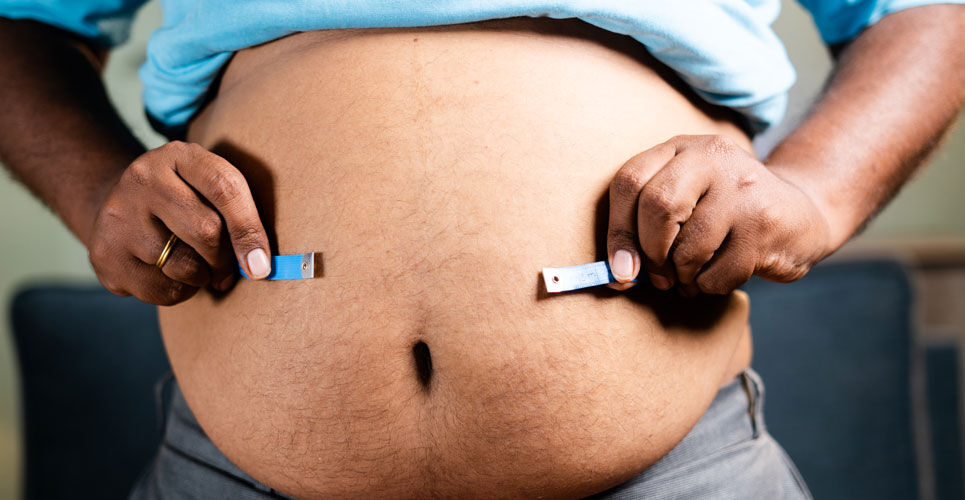Vaccination of overweight and obese individuals provides similar protection against severe COVID-19 and death to healthy weight patients
Overweight and obese patients vaccinated against COVID-19 have a similar level of protection against severe disease (based on the need for hospitalisation) and mortality as healthy weight individuals according to a large, population-based cohort study by researchers from the UK and Spain.
As more data accumulated during the COVID-19 pandemic, it became clear that obesity was a risk factor for more severe disease and even death. This was highlighted in a 2020 systematic review of 24 retrospective cohort studies, which found that the odds ratio for intensive care unit admission for obese patients was 1.21 and higher still, for invasive mechanical ventilation (OR = 2.05). Though vaccination has led to a considerable reduction in the number of patients requiring hospitalisation and dying, less is known about the impact of vaccination on overweight and obese patients. This is particularly important given the evidence from other vaccination studies that have shown how despite generating a robust serological response, vaccinated obese adults are twice as likely to develop influenza and influenza-like illness compared with healthy weight adults. Moreover, another study revealed that CD4(+) and CD8(+) T cells from overweight and obese individuals expressed lower levels of CD69, CD28, CD40 ligand, and interleukin-12 receptor, compared with healthy weight and which may contribute to the increased morbidity and mortality from H1N1 influenza A virus.
Given the limited data on the effect and subsequent outcomes after COVID-19 vaccination in overweight and obese patients, for the present study, the researchers examined the association between body mass index (BMI) and COVID-19 vaccine effectiveness with the subsequent risk of severe COVID-19 outcomes. Using the QResearch database, they developed an anonymised patient dataset from over 1,700 general practices in England, collating demographic and clinical information and then linking this with three other databases; the NHS Digital database of positive COVID-19 tests, hospital episode statistics and death certificates. Included patients were adults and who had a BMI measurement recorded in their medical records and using these reading, the researchers categorised individuals as either underweight (BMI < 18.5), healthy weight (BMI 18.5 – 24.9), overweight (BMI 25 – 29.9) or obese (BMI > 30). They examined vaccine effectiveness across the different weight categories and set the main outcomes of interest as hospitalisation and death.
Overweight and obese patients and severe COVID-19 outcomes
A total of 9,171,524 individuals with a mean age of 52 years (47% male) were included in the analysis. During the period of study there were 566,461 positive tests for COVID-19, 32,808 COVID-19-related hospital admissions and 14,389 COVID-related deaths. Across the whole cohort, 19.2% were unvaccinated, 3.1% had at least one dose, 52.6% two doses and 25% three doses. Uptake of two or three vaccine doses was more than 80% among those deemed overweight or obese.
A minimum of 14 days after the second vaccine dose, the likelihood (based on the odds ratio, OR) of a COVID-19-related hospitalisation (compared to those who were unvaccinated) was lowest for those who were either overweight (OR = 0.32, 95% CI 0.30 – 0.34) or obese (OR = 0.32, 95% CI 0.30 – 0.34) which was similar to those with a healthy weight (OR = 0.34). Interestingly, among those who were underweight, there was a slightly higher risk of hospitalisation (OR = 0.51, 95% CI 0.41 – 0.63). However, the odds of hospitalisation after a third vaccine dose were significantly less and similar for each of the different BMI categories.
In relation to mortality, there was a similar pattern 14 days after the second dose, e.g., underweight individuals (OR = 0.60), healthy weight (OR = 0.30) with overweight and obese individuals having the same odds ratio (OR = 0.26). Mortality was also significantly lower after the third dose though there was more uncertainty given the lower number of cases.
The authors concluded that both overweight and obese patients appear to be equally well protected against severe COVID-19 outcomes as those of a healthy weight although vaccine effectiveness appeared to be less in those classed as underweight.
Citation
Piernas C et al. Associations of BMI with COVID-19 vaccine uptake, vaccine effectiveness, and risk of severe COVID-19 outcomes after vaccination in England: a population-based cohort study Lancet Diabetes Endocrinol 2022

